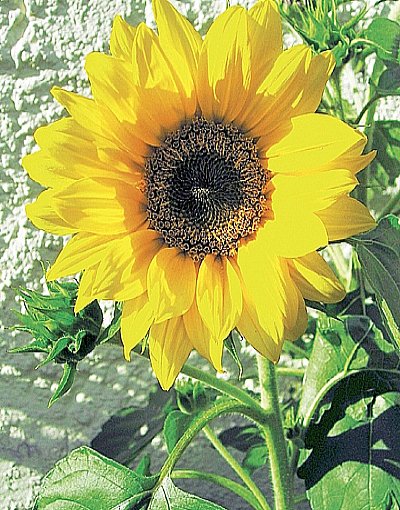Phuket Gardening: Another golden boy

PHUKET: “HELIOTROPISM” – now there’s a word to conjure with, but what does it mean? Don’t use big words if you don’t explain them.
Well, for the uninitiated, heliotropism is a plant’s diurnal motion, its capacity to slowly and imperceptibly turn towards the sun. (Helios is the Greek sun god, trope means turn in Greek).
By doing this, a plant derives maximum benefit from the sun’s beneficent rays. There is even a cool-climate plant called the heliotrope, so named on account of its capacity to pivot both flowers and leaves towards the light over the course of a single day.
Of course, some plants detest sunshine and do their very best to avoid it. If these shade lovers are over-exposed, they will, like fair-skinned people, literally get sunburnt. The result: scorched foliage and dried-out leaves.
But most plants in the tropics revel in the endless sunshine. One such plant is the sunflower (helianthus annuus). It is associated with the sun for a range of reasons. First, its name. Second, its appearance. With its huge deep orange flower heads and flame-shaped yellow petals – yes, it’s another golden boy – the flaming helianthus is so akin to a floral sun that it was used by the Mexican Aztecs as an emblem of their solar deity.
More recently, it has been celebrated in a still-life painting by Van Gogh, and a poem by William Blake. Third and last, the sunflower is – and here’s that word again – heliotropic. Its leaves and buds turn from east to west in order to follow the sun’s motion across the sky, and thereby promote the life-enhancing business of photosynthesis.
As the botanical epithet (annuus) implies, the helianthus is an annual – but what an annual. It will, given fertile soil and plenty of sunshine, grow to two or even three meters in a single year.
The flat, heavy blooms, in reality a mass of tiny, densely packed flowerets fringed by golden yellow petals, are huge – up to a foot in diameter. Since it grows tall and straight, it is an ideal plant to command the back of a herbaceous border, or stand in serried ranks at the front of a garden wall.
Just remember that it is, in common with all fast-growing plants, a voracious feeder and will need plenty of phosphate-rich fertilizer and regular watering to give its brilliant best. And at its very best, it has been known to reach eight meters in height – a giant among annuals.
Moreover, the sunflower is not only beautiful but exceedingly useful. You may have seen a field of sunflowers – a sight to behold here in Phuket. For, the helianthus is not only planted in local gardens for its massive visual impact, but is also cultivated for its seeds.
The flower heads – which quickly turn to seed – produce an oil, particularly rich in unsaturated fats, which, together with soy and palm oil, is used world-wide as an ingredient in cooking.
The seeds are also made into a bread that is popular in Germany and, as Thais well know, they make a delicious and nutritious snack. Little is thrown away: even the leaves and discarded flower heads are used as cattle feed.
That’s the beauty of plants: they can be life-enhancing, gorgeous, and utilitarian – all at the same time.
Tip of the week – Pot luck
Growing your very own plants in pots, gives you the benefit of eating ultra-fresh vegetables untainted by contact with pesticides.
Herbs such as basil, chives, spring onions and mint, are always a good option, but you can also try more substantial vegetables. Chinese kale (kai-lang), pak choi and some varieties of lettuce should be okay, even some varieties of aubergine (eggplant) or okra.
Use a potting mix that is not composed solely of commercial compost. This has little nutritional value and should be supplemented by decent top-soil. Plant your veggies in containers with drainage holes (those for water plants have none) and remember to water regularly, if not excessively.
If you are growing from seed, you can find packets in supermarkets or, even better, at the shop that specializes in fertilizer on Thepkasattri road, south of Super-Cheap.
Phuket Gardening is Patrick Campbell’s regular column on all things flora.
If you have a question or a garden that you would like featured, you can email the author here.
Keep checking our online Phuket Lifestyle pages or join our Facebook fan page for regular gardening features and tips.
— Patrick Campbell
Latest Thailand News
Follow The Thaiger on Google News:


























